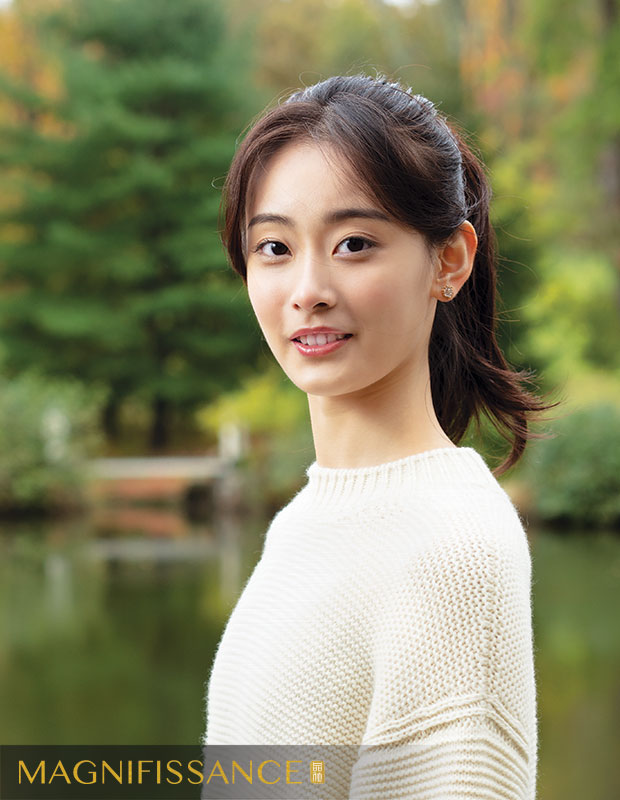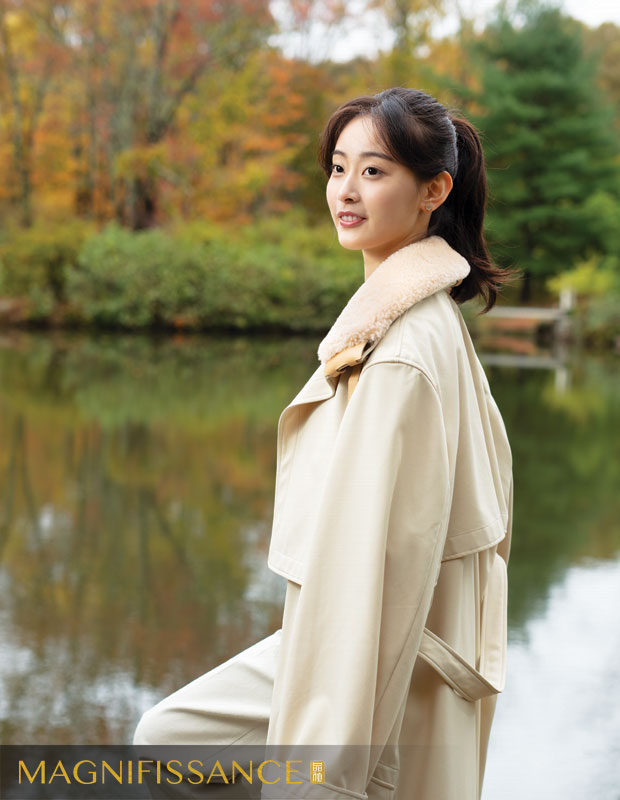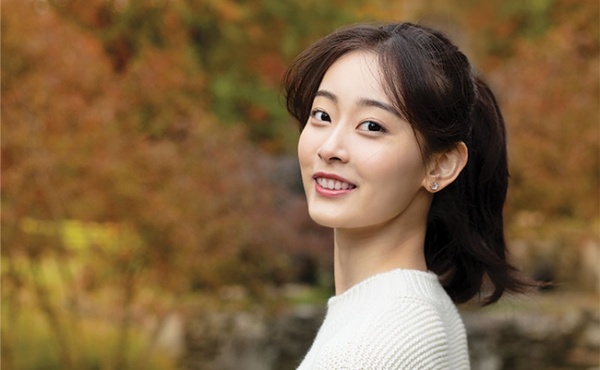Magnifissance Magazine is France and Canada's leading bilingual luxury lifestyle magazine in Chinese and English, dedicated to bridging East and West through a shared appreciation for the beauty and elegance rooted in both traditions.
In this past issue, Magnifissance featured Shen Yun lead dancer Carol Huang. Huang has been with Shen Yun since 2017. In 2018, She tied for first place in New Tang Dynasty Television’s International Classical Chinese Dance Competition (junior female division).
From Magnifissance’s The Making of a Legendary Beauty
Lady Diao Chan—one of the four legendary beauties in Chinese history—is a household name in China. The 14th-century historical novel Romance of the Three Kingdoms depicts the story of Lady Diao Chen helping her adopted father dethrone a tyrannical warlord through a plotted love triangle. She is known today as a woman of unparalleled beauty who accomplished what no warrior in the land could: ending a reign of terror.

During the late Han Dynasty, a vicious warlord seized power in the royal court. Aided by his adopted son, a fearsome mercenary, he wreaked havoc upon the empire and killed all who dared to defy him. One official, out of his loyalty to the emperor, carried out a mission impossible. He devised a plan to break up the father-son alliance by offering each of them, separately, his beautiful adopted daughter—Lady Diao Chan.
The story of Diao Chan has captured the imaginations of Chinese writers and artists for centuries and inspired many artistic renditions. In its 2019–2020 season, Shen Yun Performing Arts reproduced this legendary story in a dance drama called The Beauty Trap.
Playing Lady Diao Chan was a role given to one of Shen Yun’s rising stars and principal dancers: Carol Huang. Upon being granted an interview with her, I was exceedingly curious to meet the artist who portrayed one of the most beautiful women in Chinese history.
Dressed elegantly in a monochromatic outfit, Huang appeared before me, smiling. What struck me is that she is a happy and vivacious young woman whose mannerisms are nothing but sincere. I couldn’t find a trace of the intrigue that defined Diao Chan’s complex life. As we started talking, I asked how she managed, without saying a word, to tell the story of Diao Chan in 7 minutes—helping audiences of different backgrounds and different languages appreciate a piece of Chinese history 2,000 years old.
Most contemporary people focus on Diao Chan’s extraordinary beauty and her ability to maneuver and intrigue. Huang, however, has her own understanding. She believes that the essence of Diao Chan’s story is not about her beauty but about her devotion to her father and country.
“After reading Romance of the Three Kingdoms,” she says, “I felt that Diao Chan is very respectful of her adoptive father and devoted to her country. She’s willing to sacrifice herself for the sake of others. She’s very courageous.”
The Beauty Trap is a dance drama with a complex plot. When Huang first prepared for her role, she thought the most difficult part would be the third act, her dance with the ruthless tyrant and his adopted son. The part is full of quick movements and difficult techniques, as Diao Chan plays the two off each other. However, once she delved into the character more, Huang discovered that the most difficult part was actually the second act, in the garden, when her father first came to ask if she was willing to help him in his mission.
“Inside, she didn’t want to do it,” Huang says. “But she also saw her father’s distress, and the country’s dire situation. She was struggling with many emotions: whether she should sacrifice herself, her love and gratitude for her adoptive father, the difficulty of coming to her decision, as well as her determination once she made up her mind—that dance segment showed a complex mix of feelings.”
In order to clearly portray the character, Huang scrutinized the thought processes and emotions behind every movement for each act. She repeatedly listened to the music to integrate her feelings with it, then carried them into her movements.

Classical Chinese dance is an art form that’s steered by the artist’s heart. Only when dancers invest their feelings into the movements will the body be able to follow the heart. This creates a compelling and expressive dance form.
“The same movement can be fast or slow, sorrowful or joyful, all depending on what type of feeling the dancer wants to express,” Huang says. “The same movement can express different things because the feeling behind the movement is different. This is one of the unique characteristics of classical Chinese dance.”
Huang believes that dancing the role of Lady Diao Chan has helped her mature as a performing artist. Now she has developed a sense of rationality in her dance. To her, classical Chinese dance is not just about physical movements; it requires an intellectual mind and deep thinking. She says that because of this newly acquired rationality, she can better understand her characters, and she knows how to express them more easily.
“This is probably because throughout the process, I had to consider many things and came up with answers after some hard thinking,” she says, adding that this is all attributable to her improved understanding of traditional Chinese culture, which emphasizes the inner meanings of things.
“Just like traditional Chinese culture, classical Chinese dance focuses on inner meanings and feelings.”
Huang was born and raised in China. According to her mother, she displayed an interest in dance at a very young age. She started dancing when she was 4, studying classical Chinese dance and folk dance.
At the age of 12, she was accepted into New York’s Fei Tian Academy of the Arts, the world’s leading classical Chinese dance academy. She came to the United States and began vigorously training to become a professional dancer. In 2018, Huang won the gold prize in the junior female division at the New Tang Dynasty Television’s International Classical Chinese Dance Competition.
While her dancing career took off in New York, Huang kept worrying about her parents’ safety in China. Her parents are followers of a Chinese spiritual practice called Falun Gong. Falun Gong, also known as Falun Dafa, was very popular in China in the 1990s due to its tremendous mental and physical health benefits. The Chinese government at the time estimated that close to 100 million Chinese citizens practiced Falun Gong.
Fearing its growing popularity, Chinese communist leaders declared Falun Gong public enemy number one in July 1999, and started a brutal persecution against Falun Gong practitioners. They were sent to labour camps, mental institutions, and prisons to be tortured until they gave up the practice. Her parents experienced this persecution firsthand, as they refused to give up their belief.
In China, Falun Gong practitioners constantly face illegal detainment, imprisonment, harassment and discrimination. Huang had grown up in this environment of fear.

One time in Shen Yun, Huang played a celestial maiden in a dance drama depicting the persecution of Falun Gong in China. While onstage, she was moved by the dancers who played the practitioners being persecuted.
“When I saw how they persevered with unwavering faith, I was very touched,” she says. “I knew how difficult the situation was for practitioners inside China. I couldn’t help but think of all the people I know there.”
While in the United States, Huang didn’t hear from her parents often, and she hadn’t seen them in years. One day, she received the news that her parents were coming. Utterly surprised, she was wild with joy.
Later she learned that her parents had just escaped from China to the U.S. after being illegally detained once again. They had been talking to people on the street about Falun Gong when someone turned them in to the police. After being released, Huang’s parents decided to leave China once and for all.
Her reunion with her parents in the U.S. was bittersweet. At last, the family could be together without having to worry about each other’s safety. But there was no escaping the sadness of leaving their birthplace and starting again in a foreign country.
Huang and her parents can no longer contact their friends and family in China. But she hasn’t forgotten them. She says this fuels her determination to tell the stories of the true China and real Chinese people through classical Chinese dance.
“Sometimes I feel exhausted from the intense training,” she says. “But I know what I’m doing is very important and very special. So I persevere no matter what.”
Shen Yun is a performing arts group dedicated to reviving 5,000 years of divinely inspired culture that’s been destroyed in China under communist rule. In order to fulfill this mission, Shen Yun creates a new production each year with new choreography, new music, and new stories.
Shen Yun’s dancers, musicians, choreographers, and production designers never stop challenging themselves artistically in order to bring to their audiences a vision of what a China without communism can offer. Every year, over one million audience members in over 100 cities welcome Huang and her fellow Shen Yun artists. Her company’s tour spans over 6 months across multiple continents.
Huang is extraordinarily talented. Her energy and enthusiasm, together with her intelligence and work ethic make her a star whose upward trajectory can’t be stopped.
She says she’s truly fortunate. She’s grateful for the opportunities she’s been given, and for everyone who has supported her along the way: her parents, fellow classmates, her teachers, supporting staff, and many others.
Every year, she makes a wish while celebrating her birthday on tour. It’s the same wish year after year: improvement in dance, and a smooth, successful tour.
She’s indeed very fortunate—“Every year, my wish always comes true!”




